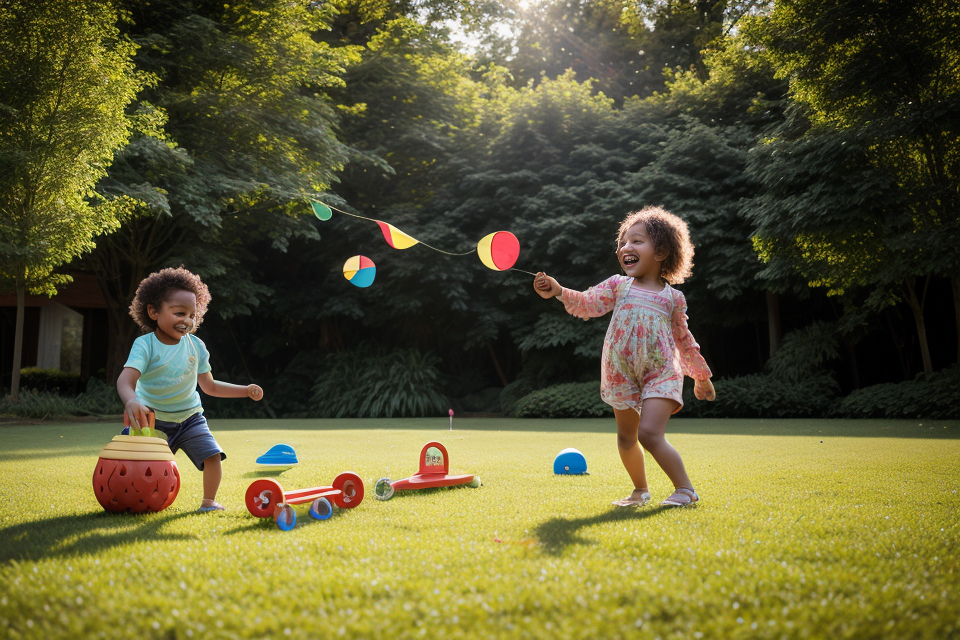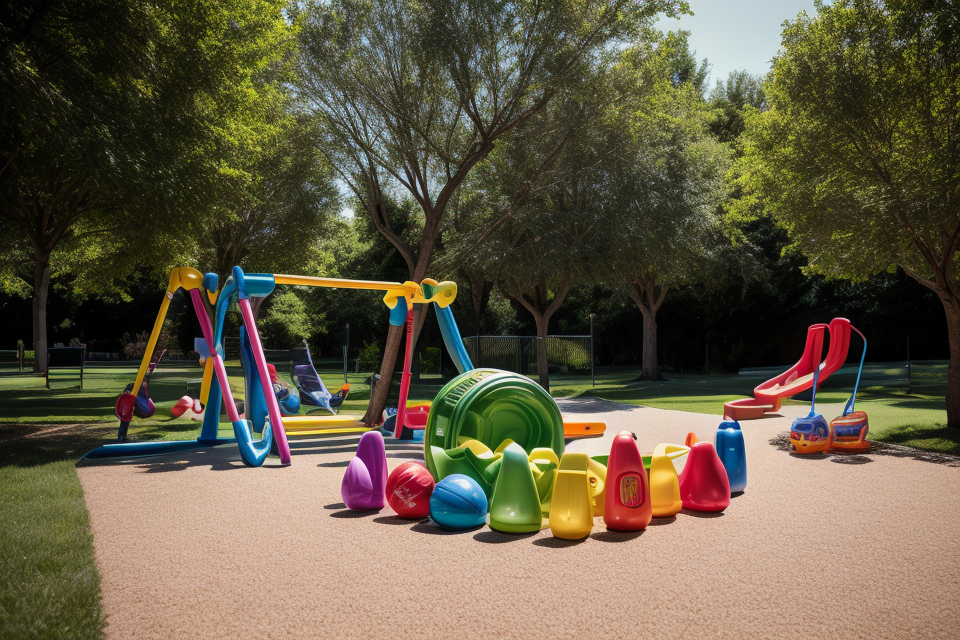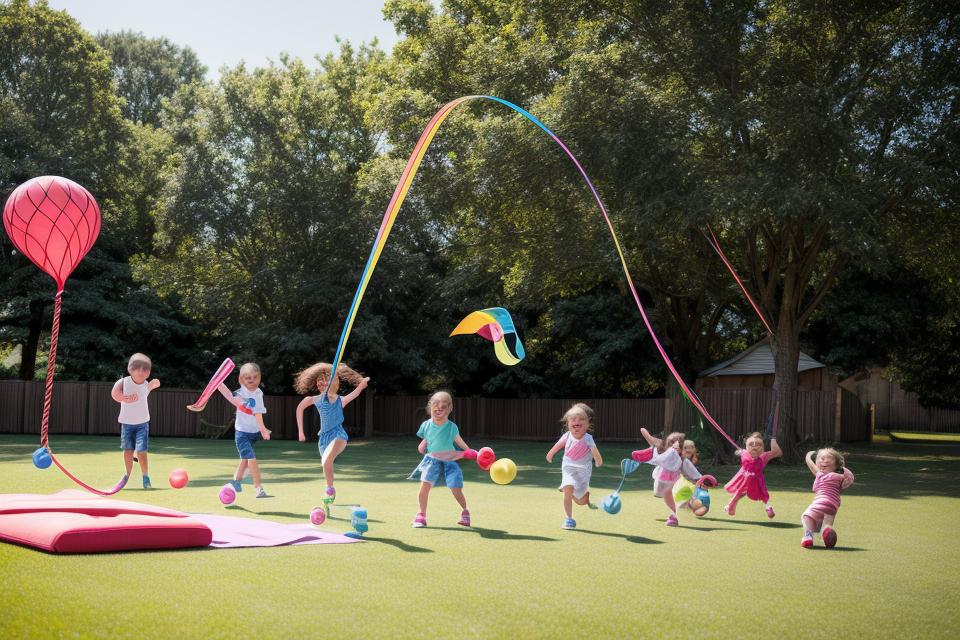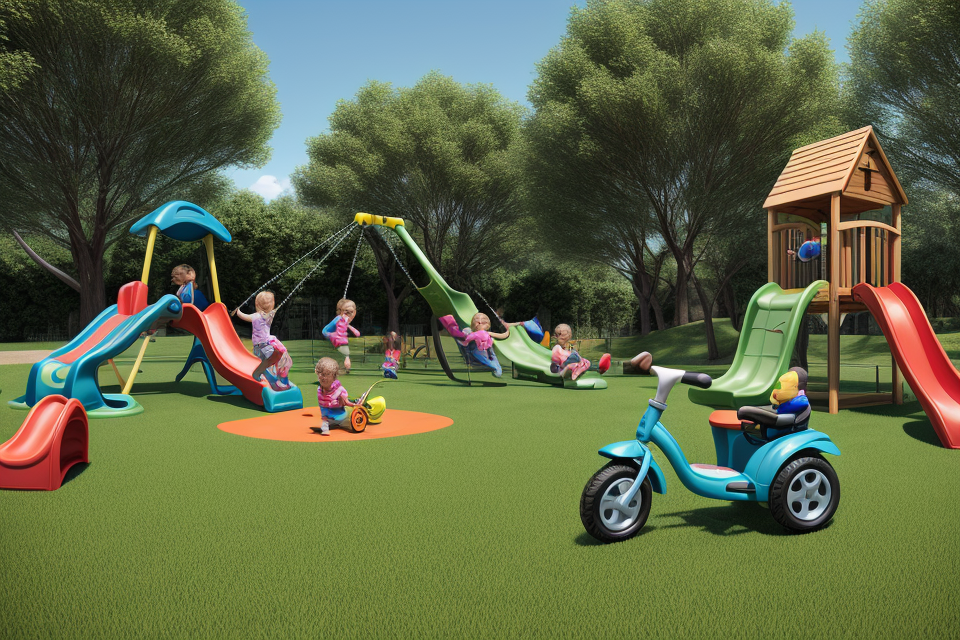Outdoor play is a crucial aspect of a child’s development. It not only provides physical exercise but also promotes cognitive, social, and emotional growth. In this article, we will explore the benefits of outdoor toys and how they can enhance a child’s development. From improving imagination and creativity to fostering a sense of exploration and adventure, outdoor play offers endless opportunities for growth and learning. Let’s dive into the world of outdoor toys and discover how they can support a child’s development in the most fun and exciting way possible.
The Importance of Outdoor Play for Child Development
Benefits of Outdoor Play
Outdoor play offers numerous benefits for children, as it provides them with an opportunity to explore and interact with the natural environment. This type of play helps to develop a child’s physical, emotional, and cognitive abilities.
Physical Development
Outdoor play is essential for the physical development of children. It helps them to develop their gross motor skills, balance, coordination, and endurance. Outdoor activities such as running, climbing, and jumping help children to build strong muscles, bones, and joints. Additionally, outdoor play also provides children with an opportunity to engage in imaginative and creative play, which helps to develop their fine motor skills.
Emotional and Social Development
Outdoor play also has a significant impact on the emotional and social development of children. It allows them to interact with nature, which has been shown to have a calming effect on the mind and body. Being in nature can also help children to develop a sense of appreciation and respect for the environment. Moreover, outdoor play provides children with an opportunity to develop social skills, such as sharing, cooperating, and communicating with others. It also helps children to build confidence and self-esteem, as they learn to navigate and adapt to different environments.
Cognitive Development
Outdoor play also contributes to the cognitive development of children. It provides them with an opportunity to learn about the natural world and develop an understanding of the environment. Through outdoor play, children can explore, discover, and experiment with different materials and objects, which helps to develop their curiosity and creativity. Additionally, outdoor play also provides children with an opportunity to engage in problem-solving activities, such as building a shelter or creating a fort, which helps to develop their critical thinking and decision-making skills.
Risks of Limited Outdoor Play
- Obesity: Limited outdoor play can contribute to obesity in children. When children do not engage in physical activity, they are more likely to be sedentary and consume excessive amounts of calories, leading to weight gain and obesity.
- Poor Mental Health: A lack of outdoor play can negatively impact a child’s mental health. Being outdoors in nature has been shown to reduce stress, anxiety, and depression in both children and adults. Without the opportunity to enjoy the outdoors, children may experience higher levels of stress and anxiety.
- Lack of Creativity and Imagination: Outdoor play encourages creativity and imagination in children. When children engage in free play in nature, they are able to explore, experiment, and create their own games and activities. This type of play fosters creativity and imagination, which are important skills for overall development.
Overall, limiting outdoor play can have serious consequences for a child’s physical and mental health, as well as their ability to be creative and imaginative. It is important for parents and caregivers to encourage outdoor play and provide children with access to outdoor toys and activities that will promote their development in these areas.
Promoting Outdoor Play through Outdoor Toys
Types of Outdoor Toys
When it comes to promoting outdoor play, the right type of outdoor toys can make all the difference. Here are some of the most common types of outdoor toys that can enhance a child’s development:
- Sports Equipment: From soccer balls to basketballs, sports equipment is a great way to encourage children to engage in physical activity. Playing sports helps children develop their motor skills, hand-eye coordination, and teamwork abilities.
- Adventure Gear: Kids love to explore and discover new things, and adventure gear like helmets, backpacks, and binoculars can provide them with the tools they need to do so safely. Adventure gear can also foster a sense of independence and self-reliance in children.
- Nature Exploration Tools: Children are naturally curious about the world around them, and nature exploration tools like magnifying glasses, bug nets, and field guides can help them explore and learn about the natural world. These tools can also foster a sense of appreciation and stewardship for the environment.
Overall, the right type of outdoor toys can provide children with endless opportunities for imaginative play, physical activity, and exploration. By promoting outdoor play, parents can help their children develop important skills and lifelong habits that will benefit them in all areas of their lives.
Choosing the Right Outdoor Toys for Your Child
When it comes to selecting outdoor toys for your child, it is important to consider several factors to ensure that the toys promote optimal development and provide hours of fun. Here are some tips to help you choose the right outdoor toys for your child:
- Consider Your Child’s Interests and Abilities:
- Every child is unique and has different interests and abilities. When choosing outdoor toys, it is important to consider your child’s individual preferences and needs. For example, if your child loves animals, a toy animal set or a miniature zoo set may be an excellent choice. If your child is into sports, a soccer ball or a basketball hoop may be more appropriate.
- It is also important to consider your child’s developmental stage and abilities when selecting outdoor toys. For younger children, toys that encourage imaginative play and exploration, such as sandbox toys or playhouses, may be more suitable. For older children, toys that promote physical activity and challenge their skills, such as bicycles or climbing structures, may be more appropriate.
- Ensure Safety and Durability:
- Safety should always be a top priority when choosing outdoor toys. Make sure that the toys you select are age-appropriate and do not pose any safety hazards, such as small parts that can be swallowed or sharp edges that can cause injuries.
- Durability is also an important factor to consider when selecting outdoor toys. Children can be rough on toys, and you want to ensure that the toys can withstand the wear and tear of outdoor play. Look for toys made with high-quality materials that can withstand the elements and stand up to regular use.
- Encourage Imagination and Creativity:
- Outdoor toys that encourage imagination and creativity can help your child develop their creative thinking skills and foster a love of play. Look for toys that allow your child to use their imagination, such as playhouses, dress-up clothes, and pretend kitchen sets.
- You can also encourage your child’s creativity by providing them with open-ended toys that can be used in multiple ways, such as building blocks or sensory toys like sand and water tables. These types of toys allow your child to use their imagination and come up with their own unique ways to play.
By considering these factors when choosing outdoor toys for your child, you can help promote optimal development and provide hours of fun and entertainment for your little ones.
Creating a Supportive Environment for Outdoor Play
Creating a Safe Outdoor Space
Creating a safe outdoor space is essential for children to enjoy and fully engage in outdoor play. This involves more than just providing a physical space for children to play in. It requires taking proactive measures to ensure that the outdoor environment is safe and suitable for children to explore and interact with.
Ensuring Safety Equipment is Available
It is crucial to provide children with appropriate safety equipment when engaging in outdoor play. This includes protective gear such as helmets, knee pads, and elbow pads for activities like cycling, skateboarding, and climbing. Additionally, it is essential to ensure that children have access to appropriate clothing and footwear that is suitable for the weather conditions and terrain they will be playing on.
Teaching Safety Skills and Precautions
In addition to providing safety equipment, it is essential to teach children safety skills and precautions to ensure their well-being while playing outdoors. This includes teaching children how to identify potential hazards and how to avoid them, as well as providing guidance on how to use safety equipment correctly. For example, teaching children how to properly wear a helmet or how to adjust the seat on a bike to ensure it fits correctly.
Establishing Clear Boundaries and Rules
Establishing clear boundaries and rules for outdoor play is also essential for ensuring children’s safety. This includes setting limits on where children can play, how far they can venture from the designated play area, and what activities are permissible. It is also important to establish rules for behavior and interactions with other children to prevent conflicts and ensure that everyone feels safe and respected.
Overall, creating a safe outdoor space for children requires a comprehensive approach that involves providing appropriate safety equipment, teaching safety skills and precautions, and establishing clear boundaries and rules. By taking these proactive measures, parents and caregivers can create a safe and supportive environment that enables children to engage in outdoor play and reap its numerous benefits.
Encouraging Outdoor Play at Home and in the Community
- Planning Family Outings and Activities
- Consider incorporating outdoor activities into family outings, such as hiking, biking, or picnicking.
- Plan regular trips to local parks, beaches, or nature reserves to explore and play.
- Encourage children to help with outdoor chores, such as gardening or cleaning up the yard, to build a sense of responsibility and connection to the environment.
- Participating in Local Outdoor Events and Programs
- Research and participate in local events and programs that promote outdoor play, such as community sports leagues, nature camps, or outdoor education programs.
- Encourage children to attend summer camps or outdoor clubs that provide opportunities for exploration and play in nature.
- Support community initiatives that promote outdoor spaces, such as building new parks or trails, to create more opportunities for outdoor play.
- Advocating for Outdoor Play in Schools and Daycares
- Work with schools and daycares to incorporate more outdoor play into daily routines, such as outdoor learning and playtime.
- Encourage schools to offer outdoor activities and clubs, such as hiking or camping clubs, to promote outdoor play.
- Advocate for outdoor play as a key component of early childhood education, highlighting the benefits of outdoor play for cognitive, social, and physical development.
The Long-Term Benefits of Outdoor Play
Developing a Love for Nature and the Environment
- Encouraging an appreciation for the natural world
- Instilling a sense of responsibility towards the environment
- Fostering a desire to protect and conserve natural resources
Outdoor play offers children the opportunity to develop a deep appreciation for nature and the environment. Through exposure to the great outdoors, children can learn to appreciate the beauty of the natural world and the importance of preserving it for future generations. By providing children with outdoor toys and encouraging them to explore and play in the great outdoors, parents can help instill a sense of responsibility towards the environment, which can have a lasting impact on their lives.
One of the key benefits of outdoor play is that it allows children to develop a sense of connection with the natural world. When children spend time playing in the park, exploring the woods, or building sandcastles at the beach, they are exposed to a wide range of natural elements, such as trees, flowers, animals, and water. This exposure helps children to develop a sense of wonder and curiosity about the world around them, which can lead to a lifelong love of nature.
In addition to fostering a love for nature, outdoor play also encourages children to take responsibility for the environment. By playing with outdoor toys such as bicycles, kites, and frisbees, children can learn to appreciate the importance of conserving natural resources and reducing waste. They can also learn about the impact of human activity on the environment and how to reduce their own carbon footprint.
Finally, outdoor play can also foster a desire to protect and conserve natural resources. By encouraging children to explore and play in the great outdoors, parents can help instill a sense of responsibility towards the environment. This can lead to a lifelong commitment to protecting and preserving the natural world, which is essential for the health and wellbeing of future generations.
Fostering a Lifelong Love of Physical Activity
- Nurturing a child’s natural curiosity and interest in movement
- Encouraging a sense of adventure and exploration
- Building confidence and self-esteem through physical accomplishments
- Developing social skills and cooperation through group activities
- Creating a strong bond with nature and the environment
- Enhancing cognitive abilities through physical exercise
- Improving overall physical health and well-being
By providing children with access to outdoor toys and encouraging them to engage in physical activity, parents and caregivers can foster a lifelong love of movement and activity. This can have a wide range of benefits for children, including reducing the risk of chronic diseases, promoting a healthy lifestyle, and enjoying the benefits of exercise.
Nurturing a child’s natural curiosity and interest in movement is an important aspect of fostering a lifelong love of physical activity. Outdoor toys that encourage exploration and movement, such as tricycles, balance bikes, and ride-on toys, can help children develop a sense of adventure and a desire to explore their surroundings. This can also help to build their confidence and self-esteem as they learn to navigate their environment and overcome physical challenges.
Encouraging a sense of adventure and exploration is another key benefit of outdoor play. By providing children with access to outdoor toys and encouraging them to explore their surroundings, parents and caregivers can help children develop a sense of curiosity and a desire to learn more about the world around them. This can also help to build their social skills and cooperation, as they learn to work together with others and share resources.
Building social skills and cooperation through group activities is another important aspect of fostering a lifelong love of physical activity. Outdoor toys that encourage group play, such as sports equipment, can help children learn to work together and cooperate with others. This can also help to create a strong bond with nature and the environment, as children learn to appreciate the beauty and diversity of the world around them.
Creating a strong bond with nature and the environment is also an important benefit of outdoor play. By encouraging children to spend time outdoors and explore their surroundings, parents and caregivers can help them develop a sense of appreciation for the natural world. This can also help to enhance cognitive abilities through physical exercise, as children learn to think critically and creatively as they navigate their environment.
Overall, fostering a lifelong love of physical activity is an important aspect of a child’s development. By providing children with access to outdoor toys and encouraging them to engage in physical activity, parents and caregivers can help children develop a wide range of skills and abilities that will serve them well throughout their lives.
Supporting Emotional and Social Well-Being
Outdoor play is not only important for physical development but also for emotional and social well-being. Exposure to nature and outdoor activities can have a positive impact on a child’s emotional and social development. Here are some ways in which outdoor play can support emotional and social well-being:
- Building Confidence and Self-Esteem: Engaging in outdoor activities and exploring new environments can help children build confidence and self-esteem. Children can develop a sense of competence and independence as they learn to navigate new challenges and environments. This can help boost their self-confidence and self-esteem.
- Developing Empathy and Cooperation: Outdoor play provides opportunities for children to interact with others and develop social skills. Through group activities and collaborative play, children can learn to cooperate, share, and understand the perspectives of others. This can help develop empathy and emotional intelligence.
- Enhancing Mental Health and Happiness: Spending time in nature has been shown to have a positive impact on mental health and happiness. Outdoor play can provide children with a sense of calm and relaxation, reduce stress and anxiety, and promote positive emotions. This can help improve overall mental health and well-being.
Overall, outdoor play can have a significant impact on a child’s emotional and social well-being. It can help build confidence, develop social skills, and enhance mental health and happiness. By providing children with opportunities to engage in outdoor activities, parents and caregivers can support their emotional and social development and set them up for long-term success.
FAQs
1. How does outdoor play affect a child’s development?
Outdoor play has a significant impact on a child’s development. It helps in the physical, cognitive, social, and emotional growth of a child. Through outdoor play, children get the opportunity to explore their surroundings, use their imagination, and develop their motor skills. It also helps in building their confidence, enhancing their creativity, and fostering social interaction.
2. What are the benefits of outdoor toys for children?
Outdoor toys provide children with endless opportunities for creative and imaginative play. They help in developing a child’s motor skills, hand-eye coordination, and dexterity. Outdoor toys also encourage children to explore and discover their surroundings, build their confidence, and enhance their social skills. Additionally, outdoor toys provide children with a sense of independence and allow them to learn and appreciate nature.
3. How can parents encourage outdoor play in their children?
Parents can encourage outdoor play in their children by setting aside dedicated time for outdoor play, creating a safe and stimulating outdoor environment, and providing age-appropriate outdoor toys. Parents can also lead by example by participating in outdoor activities with their children and promoting the importance of outdoor play in their child’s development.
4. What are some ideas for outdoor activities that can enhance a child’s development?
There are many outdoor activities that can enhance a child’s development, such as hiking, biking, and playing in the park. These activities provide children with opportunities to explore, use their imagination, and develop their physical abilities. Other activities, such as gardening and bird watching, can also promote a child’s appreciation for nature and the environment.
5. Are there any potential risks associated with outdoor play?
While outdoor play is generally safe, there are some potential risks associated with it. Parents should take measures to minimize these risks, such as ensuring their child wears appropriate clothing and safety gear, supervising their child during play, and teaching their child about safety rules and guidelines. Additionally, parents should be aware of any potential hazards in their child’s play environment and take steps to address them.



